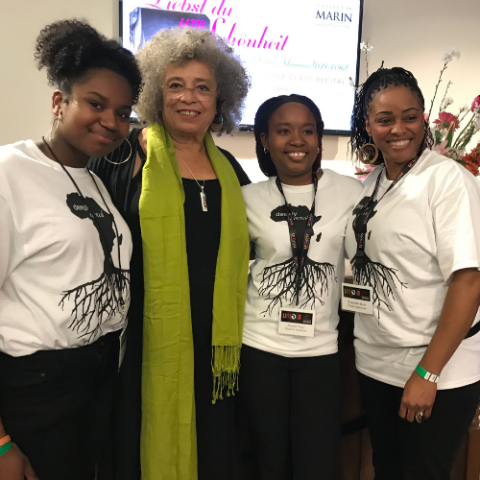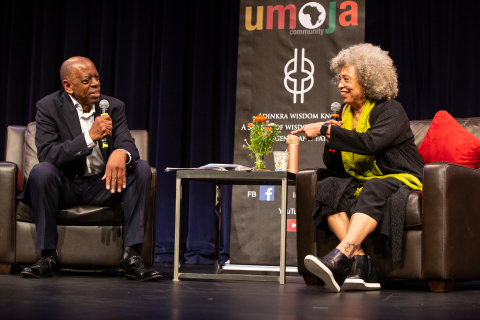This is Part I of the first story of our year-long series on College of Marin’s Umoja program. Join us every other week in 2021 to explore how COM’s Umoja program empowers students, promotes unity, and builds community and equity.

Unity
Within minutes of being announced, tickets for College of Marin (COM) Umoja program’s Conversation with Dr. Angela Davis quickly ran out. The donation-only event was so popular, they had to set up an overflow viewing room. One person told Umoja Coordinator Walter Turner they didn’t get a ticket as they thought it couldn’t be the Dr. Angela Davis, because why would she come to Marin County?
When Dr. Angela Davis arrived at College of Marin’s campus March 28, 2019, COM’s Umoja team was prepared, organized, and all hands-on deck. Basketball player volunteers helped direct the steady stream of incoming vehicles into the parking lot, Umoja students and faculty checked in guests, experienced Umoja students worked security detail for Angela Davis, Umoja students ushered guests to their seats, and high school groups were welcomed by Umoja faculty and staff.
Professor Turner, whose friendship with Dr. Davis developed through their work in social justice and human rights, asked her a few months earlier if she would be willing to speak at COM. She said she would see what she could do and soon called back with a date.
Before the main event, Angela scheduled time to talk directly with COM’s Umoja students. When she saw the chair on stage for her, she asked if it could be placed closer to the students. Angela Davis—icon, revolutionary, writer, visionary, intellectual, activist, legend—was sharing this sacred space with students, listening, smiling, engaging. Angela’s graciousness and humility quickly transformed feelings of anticipation and awe into connection and mutual respect.
English Skills Instructor and Umoja faculty Professor Patricia France was delighted her students were able to talk with Dr. Davis so they could see ‘this is not something that’s imaginary. It’s real. Here is a person who can give you advice and answer your questions. That exchange students had with her is an experience they will take with them the rest of their lives.”
Later to an audience of hundreds, she talked about prison abolition and mass incarceration, global solidarity in the struggle for social justice and human rights, her own incarceration as a political prisoner in Marin County, intersectionality and feminism, and the power of the youth. Professor Turner and Dr. Davis’s dynamic exchange weaving personal memories, pressing global social problems, and a vision of hope for the power and possibility of change captivated the audience. When she heard there were high school students in the audience, Davis beamed and spoke directly to them. She told them change is possible, to be confident and steadfast in their demands, to learn from the past but also be free enough to make mistakes and keep going. Despite all the work to be done in the struggle for liberation, she cited the changes she had seen in her lifetime, changes others tried to say would never be possible.
Dr. Davis had just returned from Uruguay before the event and was headed out on another international flight the next morning. Yet, after her standing ovation, she graciously stayed late into the evening, taking pictures and answering questions with everyone who stayed.
Dawud Anderson-Zafir, an Umoja Student Assistant who helped organize the event, said “it was one of the most fulfilling experiences. She was phenomenal. My kids were there. They volunteered. We took pictures with her. It was just such an incredible feeling to think, I can do everything that I would want to do in my life in here, in this program, and feel like I’m a huge part of it.”
Abigail Virgo, another Umoja Student Assistant and event organizer, was impressed “to see what COM Umoja could do to bring someone like her to College of Marin. It was amazing to see that our event we planned for students, members of the community, and even high school students had such a huge turn out! It was impactful and inspirational for me to see someone who is so important in black history right in front of me! She was able to bring so much change in this world being a black woman, and this left me feeling empowered!"
Umoja Community
College of Marin’s (COM) Umoja program originally grew from an unofficial mentoring project started two decades ago by faculty members Rinetta Early, Rose Thompson, and Walter Turner, as a way to help students of color who were having a difficult time navigating College of Marin and the college system.
The plan was simple. Counselor and Professor Rinetta Early told Walter Turner that if he saw students he thought needed more guidance to send them to her. Professor Early assisted students with financial aid applications, discussed how the college system works, and gave them tips on how to advocate for themselves within the classroom and the college. Early on, they saw how effective this was in helping students with their academic goals.
Many other California community colleges at the time offered either unofficial support networks like this for African American students or official ones through Black Student Unions and clubs, working individually to create programs and services for their students.

COM Umoja faculty Walter Turner talks with Angela Davis during the main event.
In 2006, the statewide Umoja Community started as a way to unify not only the colleges, but curriculum, funding, and resources for these programs. It gave colleges a statewide network and framework to help their students succeed.
Also in the 2000’s, a flurry of research reports explored the success of what became known as “learning communities.” When researchers were looking to see which students were succeeding the most academically, they saw it was often athletes. Researchers found the keys to athletes’ success were the built-in support structures they had with a coach directing them, a dedicated academic counselor who got to know their goals, tutors to assist them, and an instant family in their teammates.
Statewide Umoja used this successful support structure as their framework. Today, the statewide Umoja Community oversees student learning communities in 68 of California’s 116 community colleges. It provides all students, with an emphasis on African American students, a place to build and strengthen cultural and educational experiences while promoting student success.
Umoja is a Kiswahili word that means unity. The statewide Umoja Community brought a unifying message to the student support groups and established a learning community for the students within it. The learning community originally focused on having student cohorts attend English and Counseling classes together, and occasionally, math courses were included.
Thanks to Turner, Early, and Communication Professor Dr. Bonnie Borenstein, COM joined the statewide Umoja Program in 2015. COM’s Umoja program is designed to increase the retention, success, and graduation rates of African American students, and especially students who are first-generation college students. The program also encompasses all students who support the principles and goals of the Umoja community.
COM's Umoja program went through many changes since its inception, but students gravitated to it from the start. What began with three faculty members has since grown into a strong team dedicated to seeing their students succeed.
When Umoja Counselor, Troy Stevenson, is asked about what Umoja is, he says, “I tell students at times, ‘have you heard of Howard University? Have you heard of Historically Black Colleges and Universities (HBCU)?’ ‘Yeah, they’re back east.’ ‘Well, basically, we’re running a small HBCU at COM.’”
This Thursday read Part II from this first of many stories on COM Umoja, its core programs, and those who are and have been a part of this incredible learning community.
Discover how Umoja can help you succeed at marin.edu/umoja.
To support COM Umoja, please donate. All donations go directly to the program and student scholarships and are tax-deductible.
